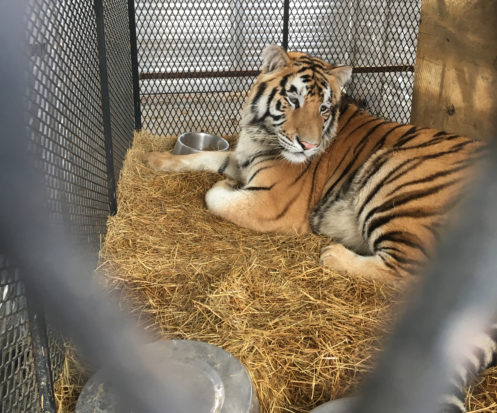
The tiger, who was found in an abandoned Houston home, is shown here getting ready for transport to the Cleveland Amory Black Beauty Ranch. Private ownership of captive tigers is a major problem in the United States. We hope this incident spurs both state and national legislators to act to more closely regulate private ownership of dangerous exotics. Photo by the HSUS
When it comes to the private ownership of captive tigers in the United States, you just can’t make this stuff up. Through the years, we’ve seen reports of tigers kept in apartments, tigers in garages, tigers in gas stations, tigers in tattoo parlors, tigers in junkyards and more. The other day, in Houston, we saw it again. A marijuana smoker looking for privacy wandered into an abandoned home, and came face to face with an adult tiger in a shoddy, unlocked cage, in a ramshackle garage enclosure fastened shut by a nylon strap.
The stunned person called a 311 dispatcher who was initially skeptical at the thought of a tiger in a house but then sent police and animal control authorities to the scene.
Two days later, thanks to officers from BARC—the City of Houston’s animal shelter—the tiger was safe at our Cleveland Amory Black Beauty Ranch. His fortunes have dramatically changed. Pending additional hearings, our hope is that, like the fictional horse who inspired the ranch’s name, this tiger’s troubles will soon be “all over.”
To be able to step in and provide an animal in need with the blessings and security of necessary care at Black Beauty, a sanctuary with suitable habitat and experienced caregivers, is a testament to the wonderful support that we receive that enables us and our affiliates to operate a world-class sanctuary and work on policy initiatives that prevent situations like this one from occurring in the first place. But this deplorable situation is not unique, and it says something especially sad about humankind. Thousands of Americans are keeping dangerous wild animals as pets, animals that simply ought not to be in private hands. To do so is cruel and unfair to the animals involved, and ultimately, it places the animals and the communities in which they reside at great risk. We continue to see it in Texas and other states whose laws and enforcement structures do not effectively address what is a rampant problem across the country. It produces tragic outcomes for people and animals, and it’s just wrong.
The Lone Star state is a particular problem in this regard, and astonishingly, after India (where tigers mostly live in the wild), Texas is estimated to have the second-largest tiger population in the world. State lawmakers are considering legislation (SB 641/HB 1268) to better regulate and control private ownership of tigers and other wild animals. Among other things, the measure protects neighborhoods, law enforcement and first responders from encountering a similar situation and would contain a grandfather clause requiring current owners to comply with certain conditions, such as carrying liability insurance.
More significantly, we expect the Big Cat Public Safety Act to be reintroduced soon in the U.S. Congress. It’s a measure to address the plight of thousands of wild animals kept privately as pets or languishing in substandard and unaccredited zoos, and prevent future ownership of big cats by unqualified and unprepared individuals. Its provisions would establish proper exemptions for qualified parties, and is a levelheaded approach to an animal welfare and public safety threat that has, unfortunately, grown worse in recent years. We badly need a national framework to bring the trade in wild animals under firm regulatory control.
There are an estimated 7000 tigers living in captivity in the United States, many in private hands and thus at risk of the uncertain fate that led to our intervention in Texas. This most recent case is emblematic of our approach. We seek to prevent the keeping of dangerous wild animals as pets through public education and public policy approaches. But we also do our best to provide a safety net for animals whose fate hangs in the balance. This is why it’s so important for animal advocates to support Black Beauty and other GFAS-accredited sanctuaries. They are vital to our mission, rescuing animals from potential harm, and educating the public about the perils of private ownership.
At the same time, it’s crucial that we engage the challenge at a policy level, by taking hold of the public debate over these animals’ welfare and the safety of human communities, and by supporting efforts to closely regulate private ownership of dangerous exotics.
We’re committed for the long term, both to stopping this practice and to ensuring the safety and well-being of animals at risk and in need. But we need your help, and your support, to set things right.
The post Tiger found in an abandoned Houston home underscores dire need for state and federal legislation appeared first on A Humane World.
Enviroshop is maintained by dedicated NetSys Interactive Inc. owners & employees who generously contribute their time to maintenance & editing, web design, custom programming, & website hosting for Enviroshop.
